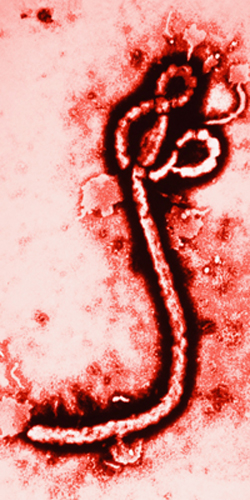|
Free Market, the State and the Spread of Ebola |
|
 According to a recent news announcement from Texas, a health care worker
who had cared for a patient infected with the Ebola virus has also been
infected with the disease despite never having visited any of the
infected countries and having worn the necessary protective clothing. A
nurse working in a Spanish hospital became infected with Ebola after
having attended to two patients who had caught Ebola in an African
nation. According to a recent news announcement from Texas, a health care worker
who had cared for a patient infected with the Ebola virus has also been
infected with the disease despite never having visited any of the
infected countries and having worn the necessary protective clothing. A
nurse working in a Spanish hospital became infected with Ebola after
having attended to two patients who had caught Ebola in an African
nation.
While most people in the Western world only became aware of the Ebola
virus in the past few years, the disease has existed in certain African
nations for centuries. When a serious disease infected a village, nobody
was allowed to leave and outsiders were kept out. The infected village
could communicate by drumbeat to appeal for help. Outsiders would bring
food to a transfer location near the infected village while locals from
the infected village maintained a physical distance to prevent
transmission of the disease. Only after the outsiders had left did the
villagers approach the drop-off point to collect the food and carry it
to their village.
A small percentage of people who become infected with Ebola and who
survive, become immune to further outbreaks of the illness. In some
regions of equatorial Africa, people dine on jungle meat that may
include any of several species of monkey and even bats, animals believed
to be carriers of Ebola. Historically, African tribes occupied and
defended small territories. Tribes that dined on jungle meat would have
encountered animal-borne Ebola-like diseases centuries ago, the outbreak
of which would have eliminated part of the tribe. After a period of
self-imposed quarantine of the village, the healthiest tribesmen would
have survived and developed immunity to the disease, possibly passing
that immunity on to later generations that could continue to dine on
jungle meat.
|
|
“While most people in the Western world only became aware of the Ebola
virus in the past few years, the disease has existed in certain African
nations for centuries.” |
|
The latest episode of Ebola may have begun with people preparing and
sharing jungle meat from an animal that was a carrier. Aid workers
providing health care in equatorial Africa may not have encountered
Ebola before, and chosen to apply Western medical methods to remedy the
outbreak. Private charities previously minimized the number of people
who became infected with Guinea worm, a water-borne parasite that lays
small eggs that are unable to pass through fine mesh strainers.
Separating sewer water from drinking water and passing the drinking
water through strainers protected people from Guinea worm infection.
Medical personnel employed by Western governments may have been
overconfident in their ability to deal with the Ebola virus, initially
advising that the disease allegedly cannot by transmitted through the
air or by being in the presence of an Ebola-infected patient. A few
doctors who operate outside of state medicine have suggested a high-dose
of intravenous vitamin C followed by short-term high doses of vitamin D3
to boost people’s immune systems. People with powerful immune systems
are known to survive Ebola and some people are known to actually become
immune to the disease.
The traditional African quarantine method was previously successful in
containing the spread of a deadly disease. Nigeria had a few cases of
Ebola and imposed quarantine by closing their borders to people from
infected countries. They have reported no further domestic outbreaks of
the disease. Political leaders in Western and Northern nations refused
to impose similar quarantine. Hospitals in industrialized nations have
had encounters with antibiotic-resistant bacteria having infected
patients, the bacteria having developed resistance after long-term
exposure to antibiotics. Western health care facilities such as seniors’
homes have previously used short-term quarantine to prevent the spread
of disease.
The Nigerian quarantine reduced the amount of public money that would
have otherwise been spent to deal with the threat of Ebola being spread
within their borders. Western and Northern governments chose an open
door policy that involves the expenditure of public money to evaluate
the health of people who arrive at airports from affected nations.
People whose health is suspect may be held in quarantine or in
isolation, perhaps at publicly funded health care facilities. But many
western hospitals are already overcrowded, with patients occupying beds
located in hospital corridors, which complicates matters, to say the
least.
|
|
|
From the same author |
|
▪
Teachers' Strikes and the Homeschooling Option
(no
324 – Sept. 15, 2014)
▪
Constitutional Rights and Market Monopoly in Ontario
(no
324 – Sept. 15, 2014)
▪
Rampaging Gunmen and Unarmed Citizens
(no
323 – June 15, 2014)
▪
The Evolving Ingenuity of the Smuggler Trade
(no
323 – June 15, 2014)
▪
Economy, State and Masculine Identity
(no
322 – May 15, 2014)
▪
More...
|
 |
|
First written appearance of the
word 'liberty,' circa 2300 B.C. |
|
Le Québécois Libre
Promoting individual liberty, free markets and voluntary
cooperation since 1998.
|
|

